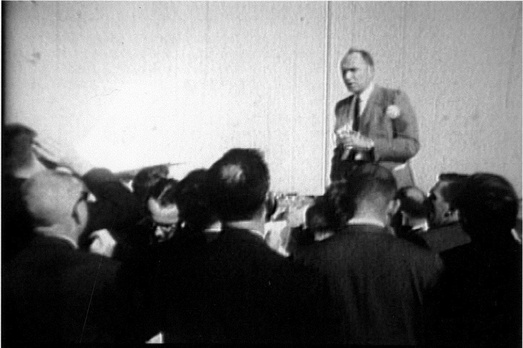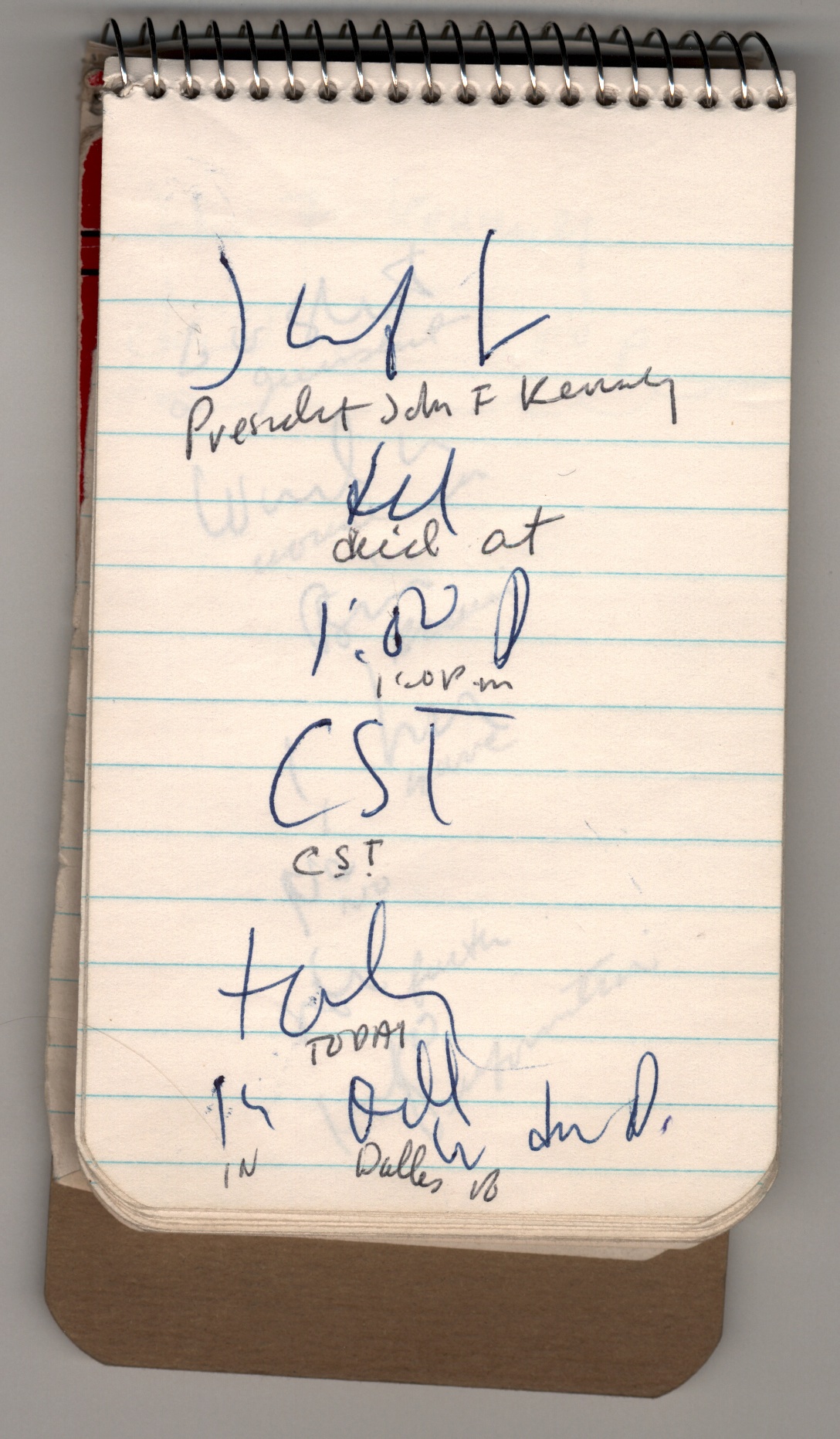
He may be the only person still living who witnessed firsthand the two pivotal events of one of the most dramatic -- and traumatic -- days in American history. And even though it was almost half a century ago, he remembers when history tapped him on the shoulder like it was yesterday. Sid Davis was a 34-year-old White House correspondent for Westinghouse Radio covering President Kennedy's fateful visit to Dallas on Nov. 21, 1963. He was in the press bus close behind Kennedy's limousine when Lee Harvey Oswald fired the shots that killed Kennedy. Then, a few hours later, he was on Air Force One watching Lyndon Johnson being sworn in as president. 
Davis giving pool report on LBJ swearing on 11/22/63, Love Field Dallas
I called Davis after reading the April 2 issue of The New Yorker, which carries an excerpt from the fourth volume of Robert Caro's monumental biography of LBJ. In it, Caro quotes Davis telling colleagues. "It's going to be hard to learn how to say President Lyndon B. Johnson." Davis, who was later Washington bureau chief and vice president of NBC-TV, wasn't interviewed by Caro, and gently disputes Caro's assertion that he and other reporters who covered Johnson as Senate majority leader thought of him as "Colonel Cornpone." But that's not the story here. The story is the 84-year-old Davis' detailed recollection of the day he had a front row seat as history was being made. "I was the pool reporter on Air Force One when we landed in Fort Worth the night before, and was on the first press bus the next day, about eight car lengths behind the president's limo as it entered Dealey Plaza," Davis recalled over lunch at a restaurant near his home in Bethesda, MD. "We heard a loud noise and I wasn't sure whether it was a motorcycle backfiring, but Bob Pierpoint [of CBS] said 'That's gunfire!' Then we heard more shots and saw people running for cover on the grassy knoll and then everything turned into chaos." The press bus speeded to the Dallas Trade Mart where some 2,000 people were waiting to hear Kennedy speak, and Davis found a pay phone and called his bureau chief, Jim Snyder, to report that shots had been fired at the presidential motorcade before president's limousine sped away. Snyder told him UPI had just issued a bulletin by Merriman Smith, who was on the bus, that Kennedy might have been hit and mortally wounded, and had been taken to Parkland Memorial Hospital. Davis ran into the street waving his portable typewriter and a man in a white Cadillac pulled over and asked if he was a reporter. "He'd heard the news on the radio and I said, 'Do you know where Parkland Hospital is?' and he said, 'Yes, I'll take you there.'" "When I got to the hospital, they had put the bubble top back on the president's limousine. I looked inside and could see blood all over the seat. A cop told me I couldn't stay there, so I went up to the second floor to find a phone, and a very nice nurse allowed me to use hers. She became sort of my assistant and kept the line open for me." As Davis ran back and forth seeking more information, he heard a Catholic priest, Fr. Oscar Huber, telling reporters he'd just given the last rites to Kennedy, and adding, "He's dead, alright." 
Davis called Snyder, and said he wanted to talk privately and off the air. "I told him what I'd just heard and I said, 'I'm sure the priest knows what a dead person looks like, but this is too important to take a chance.' He said, 'What do you think?' and I said, 'I don't think we should go with it until we get official word." A few minutes later, White House Assistant Press Secretary Malcolm Kilduff came into a nurse's training room and announced Kennedy's death. "He'd been crying, obviously, and was in grief and shock, but he kept his wits. He opened his mouth and at first, nothing came out. Then he said, 'President Kennedy died at approximately 1 p.m. Central Standard Time, today here in Dallas. He died of a gunshot wound to the brain.' Then all hell broke loose as reporters scrambled to find phones." With that, Davis showed me a scribbled page from the spiral notebook he had bought for fifteen cents the day before because he'd forgotten his. "I was writing so fast that I later filled in his words using my own shorthand." Davis then "went back to the phone the nurse held for me -- I never got her name -- and reported that the president had died." As Snyder asked for more details, "I told him Kilduff had met with Johnson just before he made the announcement and LBJ said he was leaving for Love Field and Air Force One because they didn't know if there was a conspiracy." Just then, said Davis, a White House travel office aide named Jiggs Fauver "grabbed me by the shoulder and said they needed another pool reporter to go to Love Field immediately.' I said 'I'm not in the next rotation as the pool reporter and it was Bob Pierpont's turn,' but he said, "I don't have time to look for anybody else.'" Telling Snyder he'd call back later, Davis was taken to an unmarked police car that drove him and UPI's Smith and Newsweek's Charles Roberts at high speed to Love Field. "Just as we pulled up to Air Force One, the hearse carrying Kennedy's body arrived with Jackie inside," he said. The three reporters boarded the plane, which was "steaming hot" because the air conditioning had been turned off. Davis said he "counted 27 people in the room" before Johnson appeared and asked everyone to move closer as they waited for U.S. District Judge Sarah Hughes to arrive to administer the oath of office. "I heard Johnson say to no one in particular, 'Would you ask Mrs. Kennedy if she would stand with us?' She appeared a few minutes later, looking like she was in a state of shock but very composed. Johnson took her by both hands and placed her to his left. Then he asked [an aide] to get him a glass of ice water and told Judge Hughes to proceed. They didn't have a Bible but they found a Catholic missal and Johnson took the oath. I timed it with my watch and it took exactly 28 seconds." As the plane prepared to take off for Washington, Kilduff told the reporters only two could remain, including Smith because he was from a wire service. He suggested that Davis and Roberts flip a coin for the remaining seat, but Davis said his office was waiting to hear from him and got off with Judge Hughes. "She was in tears as we watched the plane go down the field and make a U-turn and take off. I stood there unbelieving that Air Force One now was carrying a dead president and the new president. It was a very emotional moment as we watched the plane's contrails disappear." There were pay phones nearby but Davis didn't use them because as a pool reporter he wasn't to file his story before briefing other reporters. Within minutes, however, the press bus arrived and Davis climbed onto the trunk of a car and gave reporters a full account of what he had heard and seen as Johnson was sworn in. But he had to wait until the other reporters filed their stories. "I remember after I gave the pool report, they all ran for the phones. Bob Pierpoint was filing and he kept talking and I kept banging on the door saying I wanted to file. I had the only eyewitness report." Davis filed several reports through the early evening before returning to Washington late that night on the press plane. "I went from Andrews Air Force Base to the White House, and when I got there, Merriman Smith was waiting for me in the press room. He said UPI used my pool report for the exact time Johnson was sworn in, which I said was 2:38 p.m. He said, 'You S.O.B., I told you it was 2:39.'" Davis still maintains he was correct. "I know my watch was more accurate than Smitty's because broadcast reporters live and die by the second. But Smitty never agreed with me." Davis stayed at the White House and on the air all night, and at about 4 a.m., saw the flashing lights of the motorcade bearing Kennedy's body enter the White House grounds. "I could see Mrs. Kennedy sitting in the back with the casket. It was one of the saddest things I'd ever seen." He summed up the historic events he'd witnessed in a final broadcast later that day, and closed by reciting words from Robert Frost's poem, "Stopping by Woods on a Snowy Evening," which Kennedy had often quoted. "'The woods are lovely, dark and deep. But I have promises to keep, etc.' But at that point, I fell apart and the sadness of the whole thing hit and I couldn't finish." Not surprisingly, Davis said he'll read Caro's book "with great interest."